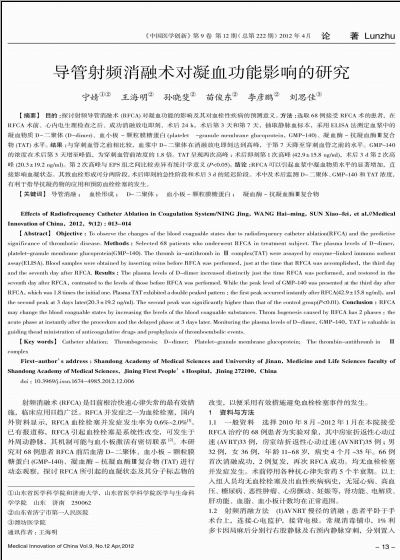导管射频消融术对凝血功能影响的研究(1)
 |
| 第1页 |
参见附件。
【摘要】 目的:探讨射频导管消融术(RFCA)对凝血功能的影响及其对血栓性疾病的预测意义。方法:选取68例接受RFCA术的患者,在RFCA术前、心内电生理检查之后、成功消融放电即刻、术后24 h,术后第3 天和第7 天,抽取静脉血标本,采用ELISA法测定血浆中的凝血物质D-二聚体(D-dimer)、血小板 -颗粒膜糖蛋白(platelet -granule membrane glucoprotein, GMP-140)、凝血酶-抗凝血酶Ⅲ复合物(TAT)水平。结果:与穿刺血管之前相比较,血浆中D-二聚体在消融放电即刻达到高峰,于第7 天降至穿刺血管之前的水平。GMP-140的浓度在术后第3 天增至峰值,为穿刺血管前浓度的1.8倍。TAT呈现两次高峰:术后即刻第1次高峰(42.9±15.8 ng/ml),术后3 d第2次高峰(20.3±19.2 ng/ml)。第2次高峰与EPS组之间比较差异有统计学意义(P<0.05)。结论:RFCA可以引起血浆中凝血物质水平的显著增加,直接影响血凝状态。其致血栓形成可分两阶段,术后即刻的急性阶段和术后3 d的延迟阶段。术中及术后监测D-二聚体、GMP-140和TAT浓度,有利于指导抗凝药物的应用和预防血栓栓塞的发生。
【关键词】 导管消融; 血栓形成; D-二聚体; 血小板 -颗粒膜糖蛋白; 凝血酶-抗凝血酶Ⅲ复合物
Effects of Radiofrequency Catheter Ablation in Coagulation System/NING Jing, WANG Hai-ming, SUN Xiao-fei, et al.//Medical Innovation of China,2012,9(12):013-014
【Abstract】 Objective: To observe the changes of the blood coaguable states due to radiofrequency catheter ablation(RFCA) and the predictive significance of thrombotic disease. Methods: Selected 68 patients who underwent RFCA in treatment subject. The plasma levels of D-dimer, platelet-granule membrane glucoprotein(GMP-140). The thromb in-antithromb inⅢ complex(TAT) were assayed by enzyme-linked immuno sorbent assay(ELISA). Blood samples were obtained by inserting veins before RFCA was performed, just at the time that RFCA was accomplished, the third day and the seventh day after RFCA. Results: The plasma levels of D-dimer increased distinctly just the time RFCA was performed, and restored in the seventh day after RFCA, contrasted to the levels of those before RFCA was performed. While the peak level of GMP-140 was presented at the third day after RFCA, which was 1.8 times the initial one. Plasma TAT exhibited a double peaked pattern: the first peak occurred instantly after RFCA(42.9±15.8 ng/ml), and the second peak at 3 days later(20.3±19.2 ng/ml). The second peak was significantly higher than that of the control group(P<0.01). Conclusion: RFCA may change the blood coaguable states by increasing the levels of the blood coaguable substances. Throm bogenesis caused by RFCA has 2 phases: the acute phase at instantly after the procedure and the delayed phase at 3 days later ......
您现在查看是摘要介绍页,详见PDF附件(3872kb)。